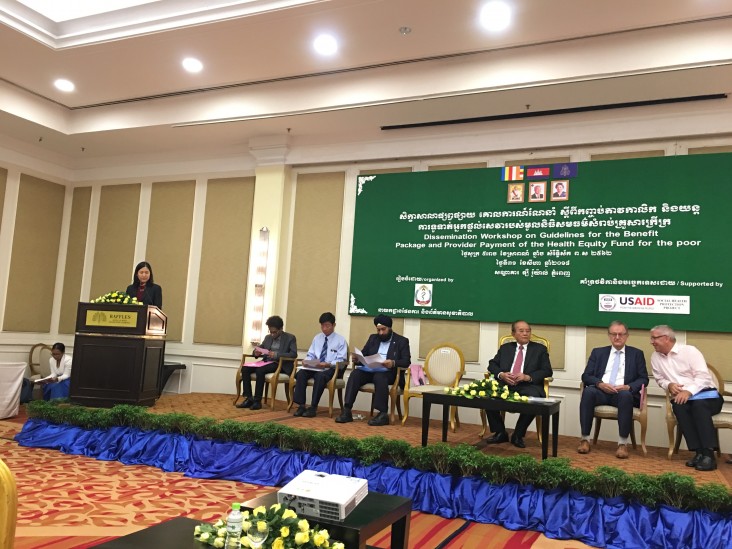Speeches Shim

(as prepared for delivery)
- H.E. Professor Eng Huot, Secretary of State of Ministry of Health
- Distinguished guests, ladies and gentlemen
I am delighted to be here representing USAID during this workshop to disseminate the new Health Equity Fund (HEF) Benefit Package and Provider Payment Guidelines. My colleagues and I are happy to see the Royal Government of Cambodia taking another important step toward the Universal Health Coverage, by expanding the coverage and benefits of Health Equity Fund to meet the needs of the poor and other vulnerable populations in Cambodia. The Ministry of Health should be proud of its leadership in social health insurance, USAID is certainly proud of our role in supporting the development of the HEF since 2003.
Over the past 20 years, HEF has grown from localized initiatives started by NGOs with donor support to a national, standardized system with increased funding and management responsibility from the Royal Government of Cambodia. These funds provide protection to the poor and vulnerable, allowing them access to healthcare services in almost all public health facilities in the country. USAID is proud to be one of the key partners in this process.
The biggest change in these new guidelines is the introduction of 39 new Service Packages. These specific packages replace the broad categories such as “inpatient care” or “outpatient care” of the old guidelines with much more specific clinical criteria, which will also help to standardize and reinforce the quality of health services.
The introduction of Service Packages will provide better understanding between health facilities, national programs and national HEF governing institutions on how priority public health services can be covered under HEF and pave the way for future social health insurance policy. The guidelines also introduce new simple, basic summaries of the services delivered with HEF invoices. Together with the patient medical records, this new feature will promote service quality and equity for HEF beneficiaries while improving transparency within the HEF system.
While USAID is proud to have supported development of the new guidelines through the USAID Social Health Protection (SHP) Project, we want to acknowledge the strong leadership from Department of Planning and Health Information (DPHI) and the collaboration from development partners and the national programs, including National Center for Tuberculosis and Leprosy Control (CENAT), National Center for HIV/AIDS, Dermatology and STD (NCHADS), National Maternal and Child Health Center (NMCHC) and the Non Communicable Disease (NCD) team, who were active members in the development process. We hope that this collaboration across the Ministry of Health and development partners will continue to strengthen the HEF system and improve the health of the Cambodian people.
Now with this new guideline in place, we proudly hand the torch to you in the audience. Everyone in this room from hospital directors, Provincial Health Directors, and Operational Districts to national programs, the Payment Certification Agency (PCA) and development partners play a key role in making sure these guidelines are implemented throughout the country to improve health outcomes among HEF beneficiaries.
Together we have come far toward our mutual goal of universal health coverage for the Cambodian people. Given Cambodia’s economic success, Universal Health Coverage is within reach. Together, let’s work to achieve it.
I want to offer my thanks to the Ministry of Health, the development partners, and the URC/SHP team for bringing us all together today. I look forward to the presentations.
Thank you.
Related Speeches
- Remarks by Menglim Kim, Project Management Specialist, USAID/Cambodia, USAID Greening Prey Lang Final Youth Debate
- Remarks by Ms. Hanh Nguyen, Deputy Mission Director USAID/Cambodia, Health Professional Councils’ Strategic Planning Orientation Workshop
- Remarks by John Eyres, Director, Office of Public Health and Education, USAID/Cambodia, Dissemination Workshop of the Fifth National Strategic Plan for a Comprehensive & Multi-sectoral Response to HIV & AIDS in Cambodia

Comment
Make a general inquiry or suggest an improvement.